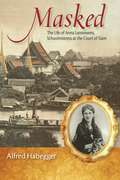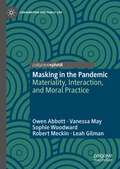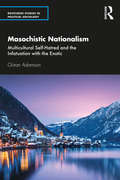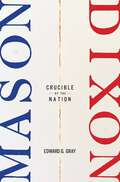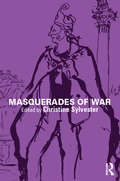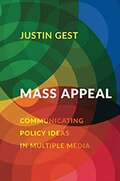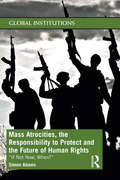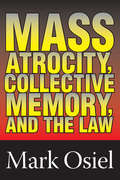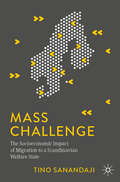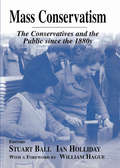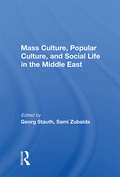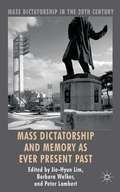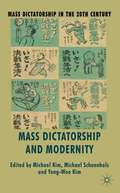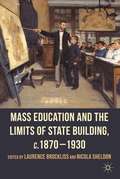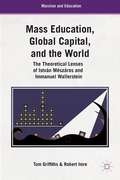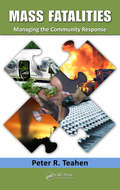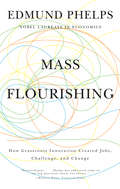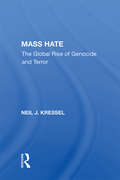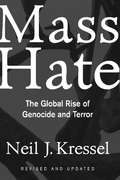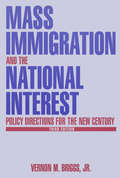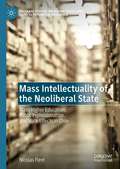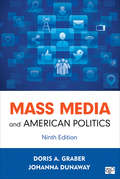- Table View
- List View
Masked
by Alfred HabeggerA brave British widow goes to Siam and-by dint of her principled and indomitable character-inspires that despotic nation to abolish slavery and absolute rule: this appealing legend first took shape after the Civil War when Anna Leonowens came to America from Bangkok and succeeded in becoming a celebrity author and lecturer. Three decades after her death, in the 1940s and 1950s, the story would be transformed into a powerful Western myth by Margaret Landon's best-selling book "Anna and the King of Siam" and Rodgers and Hammerstein's musical "The King and I. " But who was Leonowens and why did her story take hold? Although it has been known for some time that she was of Anglo-Indian parentage and that her tales about the Siamese court are unreliable, not until now, with the publication of "Masked," has there been a deeply researched account of her extraordinary life. Alfred Habegger, an award-winning biographer, draws on the archives of five continents and recent Thai-language scholarship to disclose the complex person behind the mask and the troubling facts behind the myth. He also ponders the curious fit between Leonowens's compelling fabrications and the New World's innocent dreams-in particular the dream that democracy can be spread through quick and easy interventions. Exploring the full historic complexity of what it once meant to pass as white, "Masked" pays close attention to Leonowens's midlevel origins in British India, her education at a Bombay charity school for Eurasian children, her material and social milieu in Australia and Singapore, the stresses she endured in Bangkok as a working widow, the latent melancholy that often afflicted her, the problematic aspects of her self-invention, and the welcome she found in America, where a circle of elite New England abolitionists who knew nothing about Southeast Asia gave her their uncritical support. Her embellished story would again capture America's imagination as World War II ended and a newly interventionist United States looked toward Asia. "
Masked Prey: Lucas Davenport 29 (A\prey Novel Ser. #30)
by John SandfordLucas Davenport investigates an anonymous threat to the children of US politicians in the latest thriller from the internationally bestselling author John Sandford. The daughter of a US Senator is monitoring her social media presence when she finds a picture of herself on a strange blog. And there are other pictures . . . children of other influential Washington politicians, walking or standing outside their schools, each identified by name. Surrounding the photos are vicious political rants from a variety of radical groups. It's obviously alarming – is there an unstable extremist tracking the loved ones of powerful politicians with deadly intent? But when the FBI is called in, there isn't much they can do. The anonymous photographer can't be pinned down to one location or IP address and, more importantly, no crime has actually been committed. Yet. There&’s only one person who has a hope of finding the person behind this, one person who can operate outside the FBI's constraints: Lucas Davenport. And he&’ll have to act first before someone gets hurt . . .***READERS LOVE THE PREY SERIES*** &‘One of the great novelists of all time&’ Stephen King &‘A series writer who reads like a breath of fresh air&’ Daily Mirror &‘John Sandford knows all there is to know about detonating the gut-level shocks of a good thriller&’ New York Times Book Review &‘John Sandford has the Midas touch&’ Huffington Post &‘Delivers twists to the very last sentence&’ Daily Mail &‘Crime writer John Sandford is one of the best around&’ Sun
Masking in the Pandemic: Materiality, Interaction, and Moral Practice (Consumption and Public Life)
by Sophie Woodward Vanessa May Owen Abbott Leah Gilman Robert MeckinThis book assumes an “everyday life” perspective towards masking in public spaces in the UK during the Covid-19 pandemic. Facemasks are perhaps one of the most tangible ways in which the changes wrought by the Covid-19 pandemic were made visible. In the space of a few months in 2020, masking in the UK went from being almost non-existent in public to becoming widespread, both before and after the UK government mandated masking in most enclosed public spaces in July 2020. In this context, the speed and scale of the introduction of masking in public settings offers sociologists a rare chance to document the (contested) emergence of a new social practice. We argue that the nature of masking during the pandemic means that masking practices need to be understood through the entwinement of material, interactional, and moral dimensions. We develop a relational perspective to explore the relationship between the materiality and moral significance of masking, and how this translated into the development of masking practices in public spaces. The authors argue further that the specific context of masking during the pandemic provides sociologists with a unique lens to think through the nature of material, interactional, and moral practices in general.
Masks of Authoritarianism: Hegemony, Power and Public Life in Bangladesh
by Arild Engelsen Ruud Mubashar HasanThis edited book investigates how life is affected by the increasingly authoritarian regime in Bangladesh.Earlier a flawed but real electoral democracy, over the last several years Bangladesh has been characterised as a ‘hybrid regime’ in The Economist’s Democracy Index. Today it is a country in which law still rules and leaders are still chosen – but only on paper. The uniqueness of this book is not in defining regime type or investigating trajectories. It is in its efforts to study how these changes affect everyday life. All chapters are based on intimate knowledge of a field, on first-hand experience, and on interviews and ethnography. This book will interest political scientists and scholars of Bangladesh, the Islamic world and beyond, with findings of broad relevance to hybrid regimes.
Masochistic Nationalism: Multicultural Self-Hatred and the Infatuation with the Exotic (Routledge Studies in Political Sociology)
by Göran AdamsonThis book examines the nature of the conflict between right-wing populism and multiculturalism: the West’s defining conflict in the modern age. Drawing on a plethora of evidence from politics and culture in the West, it argues that these two positions, while antagonistic on the surface, are in fact similar: nationalism and multiculturalism are two names for one idea, the difference between them being simply a matter of geography; both outlooks have their roots in romanticism, sentimentalism, arrogance and a racist outlook. Rather than defend either approach, this volume urges us to consider the importance of roots and argues for greater consideration of what classical liberalism, socialism and feminism can do to break this impasse in our political thinking, with a concern for equality and concern for solidarity, regardless of cultural practice. As such it will appeal to social and political theorists with interests in political sociology and culture.
Mason-Dixon: Crucible of the Nation
by Edward G. GrayThe first comprehensive history of the Mason-Dixon Line—a dramatic story of imperial rivalry and settler-colonial violence, the bonds of slavery and the fight for freedom.The United States is the product of border dynamics—not just at international frontiers but at the boundary that runs through its first heartland. The story of the Mason-Dixon Line is the story of America’s colonial beginnings, nation building, and conflict over slavery.Acclaimed historian Edward Gray offers the first comprehensive narrative of the America’s defining border. Formalized in 1767, the Mason-Dixon Line resolved a generations-old dispute that began with the establishment of Pennsylvania in 1681. Rivalry with the Calverts of Maryland—complicated by struggles with Dutch settlers in Delaware, breakneck agricultural development, and the resistance of Lenape and Susquehannock natives—had led to contentious jurisdictional ambiguity, full-scale battles among the colonists, and ethnic slaughter. In 1780, Pennsylvania’s Act for the Gradual Abolition of Slavery inaugurated the next phase in the Line’s history. Proslavery and antislavery sentiments had long coexisted in the Maryland–Pennsylvania borderlands, but now African Americans—enslaved and free—faced a boundary between distinct legal regimes. With the passage of the Fugitive Slave Act in 1850, the Mason-Dixon Line became a federal instrument to arrest the northward flow of freedom-seeking Blacks. Only with the end of the Civil War did the Line’s significance fade, though it continued to haunt African Americans as Jim Crow took hold.Mason-Dixon tells the gripping story of colonial grandees, Native American diplomats, Quaker abolitionists, fugitives from slavery, capitalist railroad and canal builders, US presidents, Supreme Court justices, and Underground Railroad conductors—all contending with the relentless violence and political discord of a borderland that was a transformative force in American history.
Masque of Honor: A Historical Novel of the American South
by Sharon Virts&“Set in 1816 and based on the true story of the rivalry between two Virginia gentlemen . . . an epic tale of romance, politics, ambition and power.&” —Susan Koch, Emmy and Peabody Award–winning filmmaker In this tale set in early nineteenth-century America, two sons of the Virginia aristocracy risk it all to defend their dreams and determine their own destinies. Gen. Armistead Mason and John &“Jack&” Mason McCarty are brothers-in-law, second cousins, and descendants of Founding Father George Mason IV. Armistead—by nature a politician—demands respect and strives for perfection. Jack—by inclination a rover—looks to forge his own path. When Armistead is challenged by corruption in the political machine and is denied a seat in the US Congress, the two become embroiled in a bitter dispute that sets in motion an irrevocable chain of events—leading them to the dueling grounds and an outcome that changes everything. Based on historical events of the 1819 Mason-McCarty duel, Masque of Honor is a story of courage, conviction, and the cost of sacrificing one life to forge another. &“Carries us back to life as it was two hundred years ago in the new State of Virginia . . . fascinating fiction based on facts.&” —Pamela Binnings Ewen, author of The Queen of Paris
Masquerades of War (War, Politics and Experience)
by Christine SylvesterThis collection explores the concepts and practices of masquerade as they apply to concepts and practices of war. The contributors insist that masquerades are everyday aspects of the politics, praxis, and experiences of war, while also discovering that finding masquerades and tracing how they work with war is hardly simple. With a range of theories, innovative methodologies, and contextual binoculars, masquerade emerges as a layered and complex phenomenon. It can appear as state deception, lie, or camouflage, as in the population-centric American warfare in Iraq that was sold as good for the local people, or the hidden violence Russian military forces used on each other and on local men in Chechnya. Masquerade can also be part of a people's war logic as exemplified by the Maoist movement in India. Yet masquerade can also be understood as a normal social mask that people don to foreground an identity or belief from one's cluttered repertoire in order to gain agency. Elements of masquerade can appear in texts that proclaim seemingly unequivocal positions while simultaneously yet subtly suggesting opposing positions. Masquerades of all kinds also seem ubiquitous in fieldwork research and in resistance movements in war zones. Perhaps masquerade, though, is ultimately the denial of death lurking behind the clarion call of security, a call that bolsters war by making militarized policing normal to secure populations from terrorists. These interpretations and others comprise Masquerades of War. This book will be of much interest to students of critical war studies, critical security, conflict studies and IR in general.
Mass Appeal: Communicating Policy Ideas in Multiple Media
by Justin GestPublic policy education is oriented around the development of innovative ideas for how to improve governance and make society better. However, it undervalues a critical tool for translating policy ideas into action: the ability to communicate ideas broadly, strategically, and effectively. <p><p>Drawing on his past frustration with translating his research from academia to the public sphere, Justin Gest has written a primer for public policy students, researchers, and policy professionals on how to turn analyses and memos into clear and persuasive campaigns. <p><p>This book outlines the principles, structure, and target audience for different media essential to policy communication. Including advice from practitioners and illustrative examples, Gest explains the indispensability of pithiness to clear communication and how to achieve it.
Mass Atrocities, the Responsibility to Protect and the Future of Human Rights: “If Not Now, When?” (Global Institutions)
by Simon AdamsThis book ambitiously weaves together history and politics to explain all of the major situations where mass atrocities have occurred, or been prevented, over the 15 years since the 'Responsibility to Protect' (R2P) was adopted at the 2005 UN World Summit. The author provides a history of human rights, mass atrocities and the principle of the R2P from the perspective of someone whose day job has been to work with the UN Security Council, various governments and civil society to help ensure the international community does not fail those who face the threat of genocide, war crimes and crimes against humanity today. It examines the implementation of the controversial principle of R2P since 2011 and how we end the politics of impunity, indifference and inaction once and for all. Using case studies from Iraq, Syria, Myanmar and Libya, the book offers a unique perspective regarding how we make 'never again' a living principle, rather than a cliché and how we end the politics of impunity, indifference and inaction once and for all. It will be of especial interest to scholars, students and policymakers working in the fields of international politics or concerned about human rights, atrocities, the United Nations and international justice in the world today.
Mass Atrocity, Collective Memory, and the Law
by Mark OsielTrials of those responsible for large-scale state brutality have captured public imagination in several countries. Prosecutors and judges in such cases, says Osiel, rightly aim to shape collective memory. They can do so hi ways successful as public spectacle and consistent with liberal legality. In defending this interpretation, he examines the Nuremburg and Tokyo trials, the Eicnmann prosecution, and more recent trials in Argentina and France. Such trials can never summon up a "collective conscience" of moral principles shared by all, he argues. But they can nonetheless contribute to a little-noticed kind of social solidarity.To this end, writes Osiel, we should pay closer attention to the way an experience of administrative massacre is framed within the conventions of competing theatrical genres. Defense counsel will tell the story as a tragedy, while prosecutors will present it as a morality play. The judicial task at such moments is to employ the law to recast the courtroom drama in terms of a "theater of ideas," which engages large questions of collective memory and even national identity. Osiel asserts that principles of liberal morality can be most effectively inculcated in a society traumatized by fratricide when proceedings are conducted in this fashion.The approach Osiel advocates requires courts to confront questions of historical interpretation and moral pedagogy generally regarded as beyond their professional competence. It also raises objections that defendants' rights will be sacrificed, historical understanding distorted, and that the law cannot willfully influence collective memory, at least not when lawyers acknowledge this aim. Osiel responds to all these objections, and others. Lawyers, judges, sociologists, historians, and political theorists will find this a compelling contribution to debates on the meaning and consequences of genocide.
Mass Challenge: The Socioeconomic Impact of Migration to a Scandinavian Welfare State
by Tino SanandajiThis book addresses the socioeconomic effects of immigration to Sweden. Historically, Sweden was a homogeneous country. In recent years, this has changed dramatically as Sweden has received more refugees per capita than any comparable country: this makes Sweden an interesting case study for analyzing the social and economic impact of refugee migration to European welfare states. The book highlights the long-term effects of low-skilled immigration to welfare states, while tying this to the broader European experience. Much of the public discussion of immigration in the West has focused on the American experience, which differs significantly from refugee migration to European welfare states. Research has shown that immigration is not a unitary phenomenon, and that its social and economic effects depend both on the type of migrants and on the receiving country. As demonstrated in the book, European welfare states have fairly similar outcomes with regard to refugee migration, but with differences in degree and the scale of migration. Their experience, however, contrasts with American outcomes as well as with high-skilled migration to Europe. This book is a translated, updated, and expanded version of the successful Swedish original entitled Massutmaning (2017).This book is translated by Jonas Vesterberg and edited by Pontus Tholin.
Mass Conservatism: The Conservatives and the Public since the 1880s (British Politics and Society)
by William Hague Ian Holliday Stuart BallThe papers that comprise this volume reveal how people are intent on preserving not only their wealth but culture too. The individual contributions identify the key arguments used to coax voters, whose natural sympathies might gravitate to the left, to vote for the Conservative Party en masse.
Mass Culture, Popular Culture, And Social Life In The Middle East
by Georg StauthThe papers in this collection have a common theme in the question of modernity and mass culture. Two papers, those by Chaney and Featherstone respectively, discuss aspects of this theme in a general, global context, all the others are concerned more specifically with the regional context of the Middle East. All the articles in this collection were
Mass Dictatorship and Memory as Ever Present Past
by Peter Lambert Jie-Hyun Lim Barbara WalkerThis volume explores the politics of memory involved in 'coming to terms with the past' of mass dictatorship on a global scale. Considering how a growing sense of global connectivity and global human rights politics changed the memory landscape, the essays explore entangled pasts of dictatorships.
Mass Dictatorship and Modernity
by Michael Kim Michael Schoenhals Yong-Woo KimMass Dictatorship and Modernity is the second volume in the 'Mass Dictatorship' series. A transnational, academic research venture, it interrogates mass dictatorship in a broad historical context, focusing on the emergence of modernity through interactions of center and periphery, empire and colony, and democracy and dictatorship on a global scale.
Mass Education and the Limits of State Building, c.1870–1930
by Laurence Brockliss Nicola SheldonThe first comparative study of the spread of mass education around the world in the late nineteenth and early twentieth centuries, this unique new book uses a bottom-up focus and demonstrates, to an extent not appreciated hitherto, the gulf between the intentions of the government and the reality on the ground.
Mass Education, Global Capital, And The World
by Tom G. Griffiths Robert ImreBy presenting a series of intricate analyses of educational phenomena through the theoretical lenses offered by Immanuel Wallerstein and Istv#65533;n M#65533;sz#65533;ros, the book engages readers and helps them to critically analyze their own participation in the global economy, as citizens, policy-makers, and academics or teachers.
Mass Fatalities: Managing the Community Response
by Peter R. TeahenA mass fatalities response goes far beyond returning the remains of a loved one to surviving family members. Those charged with this grim but critical responsibility will find themselves immersed in multiple tasks involving diverse individuals, organizations, and priorities. Mass Fatalities: Managing the Community Response examines multiple complex
Mass Flourishing: How Grassroots Innovation Created Jobs, Challenge, and Change
by Edmund S. PhelpsIn this book, Nobel Prize-winning economist Edmund Phelps draws on a lifetime of thinking to make a sweeping new argument about what makes nations prosper--and why the sources of that prosperity are under threat today. Why did prosperity explode in some nations between the 1820s and 1960s, creating not just unprecedented material wealth but "flourishing"--meaningful work, self-expression, and personal growth for more people than ever before? Phelps makes the case that the wellspring of this flourishing was modern values such as the desire to create, explore, and meet challenges. These values fueled the grassroots dynamism that was necessary for widespread, indigenous innovation. Most innovation wasn't driven by a few isolated visionaries like Henry Ford and Steve Jobs; rather, it was driven by millions of people empowered to think of, develop, and market innumerable new products and processes, and improvements to existing ones. Mass flourishing--a combination of material well-being and the "good life" in a broader sense--was created by this mass innovation. Yet indigenous innovation and flourishing weakened decades ago. In America, evidence indicates that innovation and job satisfaction have decreased since the late 1960s, while postwar Europe has never recaptured its former dynamism. The reason, Phelps argues, is that the modern values underlying the modern economy are under threat by a resurgence of traditional, corporatist values that put the community and state over the individual. The ultimate fate of modern values is now the most pressing question for the West: will Western nations recommit themselves to modernity, grassroots dynamism, indigenous innovation, and widespread personal fulfillment, or will we go on with a narrowed innovation that limits flourishing to a few? A book of immense practical and intellectual importance, Mass Flourishing is essential reading for anyone who cares about the sources of prosperity and the future of the West.
Mass Hate: The Global Rise Of Genocide And Terror
by Neil J. KresselThis book draws together the results of six decades of research on the psychology of mass hate. It focuses on situations where large portions of nations or cultural groups have participated in mass murder, acts of terror, or other atrocities against unarmed civilians.
Mass Hate: The Global Rise of Genocide and Terror
by Neil J. KresselMass Hate explores why the brutality of humankind erupted and flowed more expansively in the twentieth century than ever before. Psychologist Neil Kressel recommends specific steps to help stem this bloody global tide of slaughter, terror and genocide. In his investigation, Kressel focuses on the horrifying butchery in Rwanda, the terrifying tactics of rape and torture of women in Bosnia, the systematic murder of Jews and others during the Holocaust. He examines history, psychology, and political science for explanations of what propels a citizen to raise a machete against innocent neighbors, and, in a moving conclusion, suggests practical ways for humankind to eradicate the causes of mass hate. Now included in the preface is a discussion of the terrorist attack of September 11, 2001, on New York and the Pentagon.
Mass Immigration and the National Interest: Policy Directions for the New Century
by Robert O BriggsAs America begins the 21st century there is growing outcry across the land for reform of the nation's chaotic immigration policies. This text shows how immigration patterns are in direct conflict with emerging labour market trends and constitute a serious threat to the jobs of American workers.
Mass Intellectuality of the Neoliberal State: Mass Higher Education, Public Professionalism, and State Effects in Chile (Palgrave Studies on Global Policy and Critical Futures in Education)
by Nicolas FleetThis book addresses the political effects of the massification of higher education and intellectual labor in the neoliberal state. Using the case of Chile, the author argues that public professionalism emerges in the mass university system, producing excesses of knowledge which infuse the state with political purpose at many levels. The emergence of the student movement in 2011, then the major social mobilization against the neoliberal state since the restoration of democracy in 1990, provided a clear manifestation of the politicization and ideological divisions of the mass university system. In conditions of mass intellectuality, public professionals mobilize their political affinities and links with society, eventually affecting the direction of state power, even against neoliberal policy. Through several interviews with academics, public professionals, and other documentary and statistical analyses, the book illustrates the different sites of political socialization and the ideological effectiveness of the emergent mass intellectuality of the neoliberal state.
Mass Media and American Politics
by Doris A. Graber Johanna L. DunawayWith new coauthor Johanna Dunaway, the ninth edition of Doris Graber’s classic book, Mass Media and American Politics, is thoroughly updated to reflect major structural changes that have shaken the world of political news, including new chapters on the impact of the changing media landscape and on negativity, incivility, and bias. Always a balance of comprehensive coverage and cutting-edge theory, this book shows students how the media influence governmental institutions and functions, and in turn how the government shapes the way the media disseminate information. The book’s broad coverage has three focal points: the purpose and structure of media; its impact on the attitudes of ordinary Americans and political elites; and the ways in which the news media cover government and politics.
